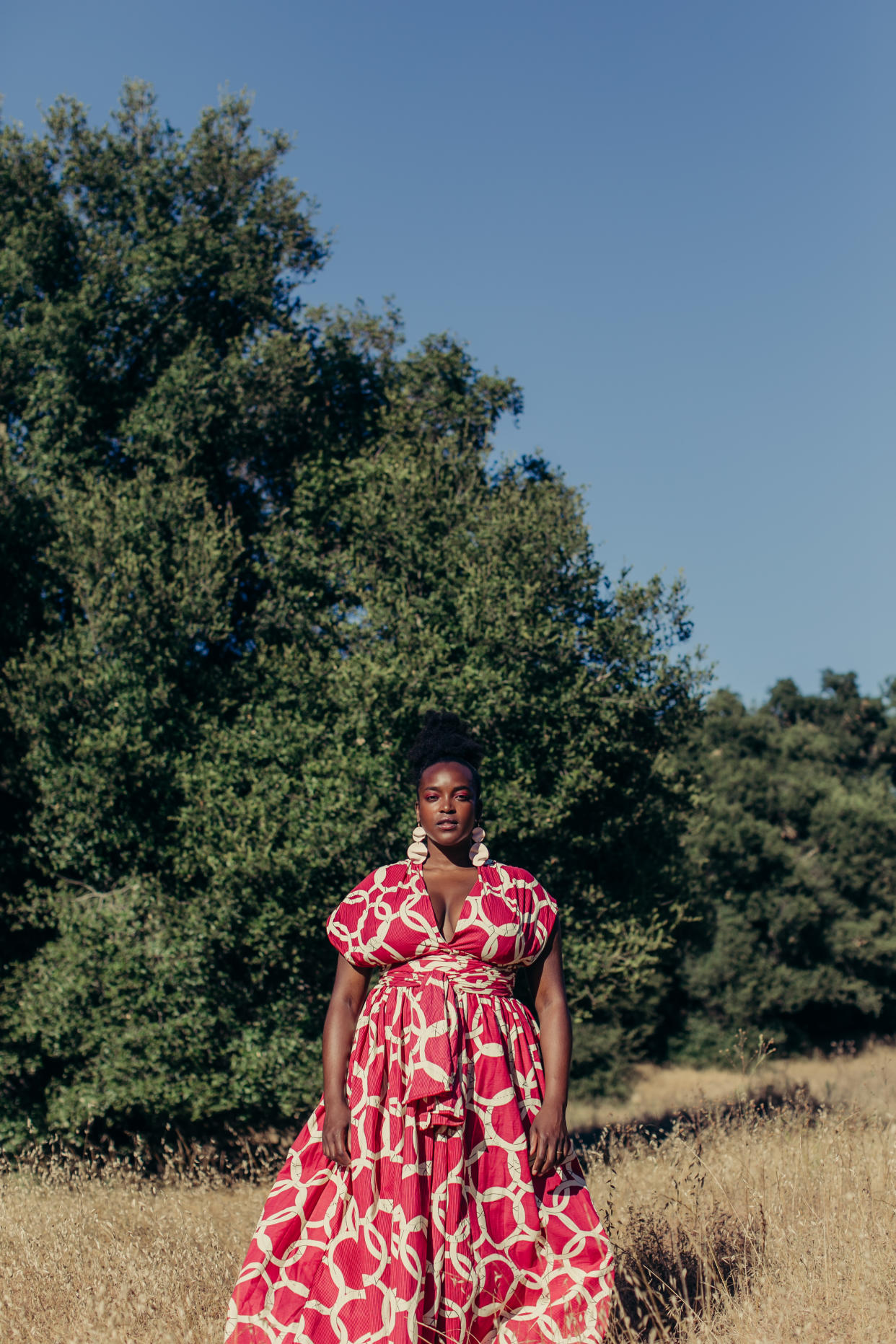Feeling at Home With Wunmi Mosaku

During the pandemic, Wunmi Mosaku has immersed herself in the art of gardening. Put in the work, tend to what you’ve planted and you’ll reap a reward.
“I plant vegetables and every time I see a flower I’m like” — Mosaku gasps — “I’m going to get a vegetable in a few weeks!”
It’s a fitting pastime for an actress; waiting is often the name of the game in film and television — waiting for funding, waiting to hear back about auditions, waiting to find out when the project will be released. Mosaku, like many in the industry, is waiting to hear when her current project will get back to filming after being paused earlier this spring.
The BAFTA-winning British actress, who currently lives in Los Angeles with her husband, has settled into a place of stillness the past few months after several years of constant travel. “It’s been a revelation being home, with no pressure and no expectations to do anything,” she says, although from her list of recent activities — gardening, running, sewing, cooking, writing — she’s managed to stay quite busy at home.
Plus, she has the release of two buzzy projects to talk about.
Mosaku has a supporting role in the much-anticipated ensemble series “Lovecraft Country,” which premiered on HBO on Sunday. The series, executive produced by Jordan Peele and led by showrunner Misha Green, is based on a novel by Matt Ruff and incorporates the sci-fi horror of H.P. Lovecraft’s fiction with realistic horror of the Jim Crow-era south. Mosaku notes that she didn’t know much about Lovecraft — the early 1900s genre writer, now recognized as deeply racist — but connected with the tangled family drama of the show living within the larger premise of inequality and white supremacy. The sci-fi elements are easy to forget as the family and socio political drama and racial tension amps up, and act almost as a barometer: which of these monsters is scarier?
“Sci-fi and horror feel so relevant to me as a woman,” Mosaku says. “How can this still feel relevant? How can this still feel like a story in which I need to process a lot of things myself?”
Mosaku, who stars as lead Jurnee Smollett’s half sister in the show, credits Green for translating the book (which was written by a white man) onscreen and fleshing out a world that felt real and complicated. She describes the characters and overall series as rich, wild, bold and relevant; fully fleshed out, complicated and real. Integral to that process were honest discussions led by Green, and the emotional safety to truthfully answer questions about identity, society and the decisions that people make and why they make them — both in terms of their characters, but also themselves as people.
“It would be very difficult to answer those questions or even have those questions asked by someone who wasn’t a Black woman,” Mosaku says. “Having those honest conversations would have been near impossible without speaking to someone who feels like a mirror, who has experienced the world as you have experienced it.”
Similar questions are also central in “His House.” The indie thriller from first-time feature director Remi Weekes uses horror tropes to explore the trauma of two Sudanese refugees settling into government-provided housing in the U.K. Mosaku, who costars with Sope Dirisu, attended the Sundance Film Festival in January for the first time for the film’s premiere, where it was enthusiastically received by critics and audiences. The film was acquired before the festival by Netflix and is set for a fall release.
Like “Lovecraft Country,” the film juxtaposes humanity and horror, with empathy — or lack thereof — playing an important role in the story.
“It’s not just bumps in the night, it’s not just gore and blood,” says Mosaku, although there are some of those elements in the film, too. “The suspense is everything that you’ve been through; you’re haunted by the past, you’re haunted by the present, you’re haunted by the house, you’re haunted by the fact that you’re away from home and in a foreign country, and you’re haunted by the things that you’ve done.”
Preparing for the film involved researching life in Sudan before the civil war, and mapping what a refugee’s journey to the U.K. might look like. Mosaku considers that process of understanding the past as imperative to understanding the present.
“What happened to us before is why we’re here. Why we make the decisions we make, how we respond to things — it’s all because of the people, the journey we’ve taken up until this point,” Mosaku says. “That was really important for us to know why we’re here. Why we respond how we respond, why we feel how we feel.”
More From the Eye:
The Power of Dominique Fishback
Brittany O’Grady Finds Her Voice
‘She Dies Tomorrow’ Director Amy Seimetz Touches on the Inevitable
Best of WWD
Sign up for WWD's Newsletter. For the latest news, follow us on Twitter, Facebook, and Instagram.

